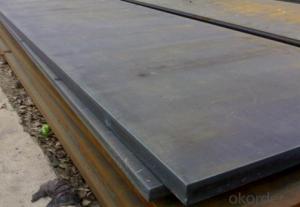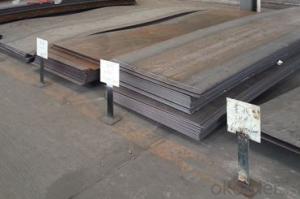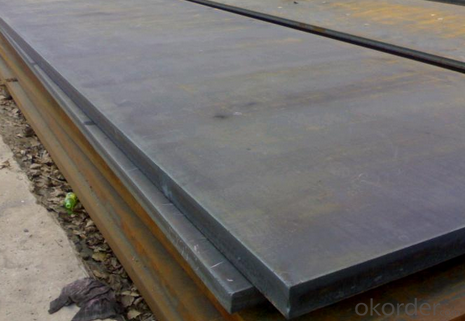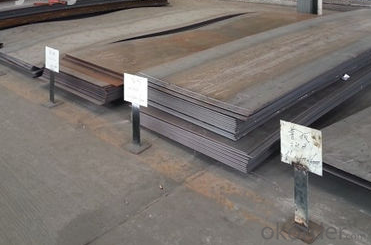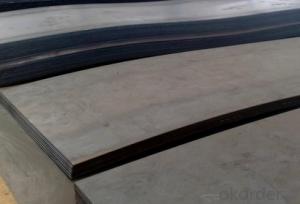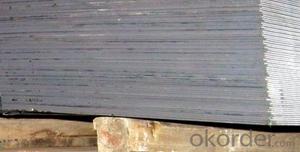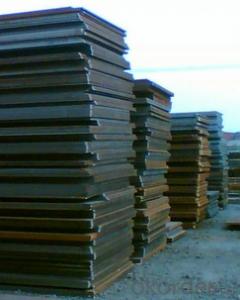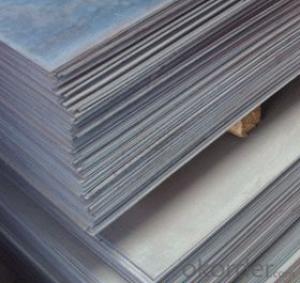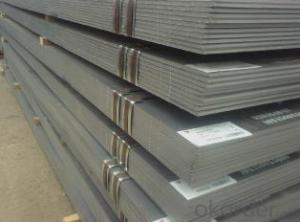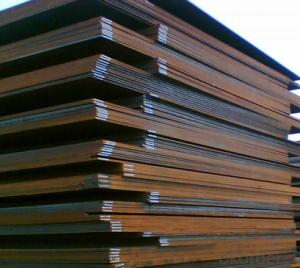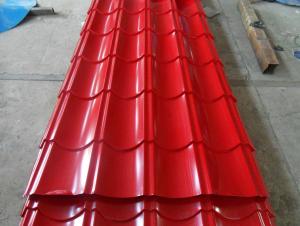Hot Rolled Carbon Steel Sheet Q235 CNBM
- Loading Port:
- Qingdao
- Payment Terms:
- TT OR LC
- Min Order Qty:
- 10 pc
- Supply Capability:
- 30 pc/month
OKorder Service Pledge
Quality Product, Order Online Tracking, Timely Delivery
OKorder Financial Service
Credit Rating, Credit Services, Credit Purchasing
You Might Also Like
Quick Details
| Standard: | AISI, ASTM, DIN, GB, JIS | Grade: | A572,A573,A633,A678,A709,A710,G3101,G3136,etc | Thickness: | 1mm-200mm |
| Brand Name: | SHOU GANG GROUP, AN STEEL | Model Number: | Q235 | ||
| Type: | Steel Plate | Technique: | Hot Rolled | Surface Treatment: | Coated |
| Application: | widely | Special Use: | High-strength Steel Plate | Width: | 1000mm-3000mm |
| Length: | 1000mm-12000mm | Price Term: | FOB CIF CFR |
Packaging & Delivery
| Packaging Details: | standard seaworthy export packing or as the request of customers |
| Delivery Detail: | 10 days after deposit or according to customers' quantity |
Specifications
hot rolled carbon steel sheet
1.Thickness:1mm-200mm
2.Length:1000mm-12000mm
3.Width:1000mm-2000mm
hot rolled carbon steel sheet
| Product | HR steel plate prices carbon steel plate prices per kg |
| MOQ | 25 ton |
| Thickness | 1mm-200mm |
| Width | 1000mm-3000mm |
| Length | 1000mm-12000mm |
| Application | widely |
| Standard | AISI,ASTM,BS,DIN,JIS,GB,etc |
| Grade | A572,A573,A633,A678,A709,A710,G3101,G3136,etc |
| Tpye | Steel plate |
| Surfacing | Coated |
| Productive Technology | Hot Rolled & Cold Rolled |
| Port | |
| Payment Terms | L/C,T/T,Western Union,MoneyGram |
| Product Ability | 5000 tons per month |
| Delivery | 10 days after deposit or according to customers' quantity |
| Packing | standard seaworthy export packing or as the request of customers |
- Q: What are the different profile options available for steel sheets?
- Steel sheets come in various profile options, each serving distinct purposes and offering unique advantages. Some commonly used profiles are: 1. Plain Sheet: This is the most basic option with a flat surface and no additional features. It is commonly employed for general purposes where aesthetics are not a priority. 2. Corrugated Sheet: These sheets have parallel ridges and grooves, forming a wavy pattern. They provide extra strength and rigidity, making them ideal for roofing, cladding, and fencing. The ridges also facilitate water shedding, preventing water accumulation. 3. Ribbed Sheet: Ribbed sheets have raised parallel ridges or ribs along their length. This profile offers enhanced strength and load-bearing capacity, making it suitable for applications requiring structural integrity, like mezzanine floors, decking, and industrial flooring. 4. Perforated Sheet: Perforated sheets have a pattern of punched holes, allowing for ventilation, light transmission, and drainage. They are commonly used in architectural designs, façades, acoustics, and filtration systems. 5. Tread Plate: Tread plates have an embossed pattern of lines or diamonds on the surface. This profile provides extra grip and slip resistance, making it ideal for industrial flooring, stairs, ramps, and walkways. 6. Expanded Metal: Expanded metal sheets are created by cutting and stretching a flat sheet, resulting in diamond-shaped openings. This profile offers excellent ventilation, visibility, and security, making it suitable for grilles, screens, fences, and enclosures. 7. Lipped Sheet: Lipped steel sheets have an edge or lip bent at a 90-degree angle along one or more sides. This profile provides added strength and stiffness, commonly used for framing, shelving, and edge protection. These are just a few examples of the available profile options for steel sheets. The choice of profile depends on specific requirements such as strength, durability, aesthetics, and functionality.
- Q: Can steel sheets be used for modular construction?
- Yes, steel sheets can be used for modular construction. Steel sheets are often used in modular construction due to their high strength, durability, and versatility. They can be easily fabricated into different shapes and sizes, making them suitable for constructing modular units such as walls, floors, and roofs. Additionally, steel sheets offer excellent resistance to fire, pests, and weather conditions, making them a popular choice in modular construction projects.
- Q: Can steel sheets be used in acidic environments?
- Yes, steel sheets can be used in acidic environments, but the type of steel used and the concentration of the acid must be considered. Stainless steel or corrosion-resistant alloys are often preferred for their ability to withstand acidic conditions without corroding.
- Q: How do steel sheets compare to other materials like aluminum or plastic?
- Steel sheets are generally stronger and more durable compared to aluminum or plastic sheets. They have a higher tensile strength and can withstand heavier loads. However, steel sheets are heavier and may require additional support structures. Aluminum sheets are lightweight and have good corrosion resistance but are not as strong as steel. Plastic sheets are lightweight and inexpensive, but they lack the strength and durability of steel or aluminum. Ultimately, the choice between steel, aluminum, or plastic sheets depends on the specific application and requirements.
- Q: Can steel sheets be used for roofing purposes?
- Yes, steel sheets can be used for roofing purposes. Steel is a durable and long-lasting material that is resistant to corrosion, making it an excellent choice for roofing. Steel sheets provide strength and stability to the roof, protecting the building from various weather conditions. Additionally, steel roofs are low maintenance and can be energy-efficient if properly insulated.
- Q: Are steel sheets resistant to impact or puncture?
- Yes, steel sheets are highly resistant to both impact and puncture due to their strong and sturdy nature.
- Q: What is the average yield strength of steel sheets?
- The specific grade and thickness of steel being used can cause variations in the average yield strength of steel sheets. Typically, the average yield strength of steel sheets falls between 250 and 600 megapascals (MPa). It is worth noting that different steel grades, such as mild steel, high-strength low-alloy (HSLA) steel, or stainless steel, will have different average yield strengths. Furthermore, the yield strength of a steel sheet can be affected by its thickness, with thinner sheets generally having higher yield strengths. Therefore, it is crucial to refer to the manufacturer's specifications or industry guidelines to determine the specific average yield strength for a particular steel sheet.
- Q: What is the difference between a standard and high-strength steel sheet?
- The main difference between a standard and high-strength steel sheet lies in their mechanical properties. High-strength steel sheets have a higher yield strength and tensile strength compared to standard steel sheets. This means that high-strength steel sheets can withstand greater forces and pressure before deformation or failure occurs. They are commonly used in applications where durability and load-bearing capacity are critical, such as in automotive and construction industries. Standard steel sheets, on the other hand, have lower strength properties but are often more cost-effective and suitable for less demanding applications.
- Q: How are steel sheets produced?
- Steel sheets are produced through a process called steel rolling, where large steel slabs are heated and passed through a series of rollers to reduce their thickness and achieve the desired shape and size.
- Q: Can the steel sheets be used for storage racks or shelves?
- Yes, steel sheets can be used for storage racks or shelves as they provide durability, strength, and stability required for supporting heavy loads.
Send your message to us
Hot Rolled Carbon Steel Sheet Q235 CNBM
- Loading Port:
- Qingdao
- Payment Terms:
- TT OR LC
- Min Order Qty:
- 10 pc
- Supply Capability:
- 30 pc/month
OKorder Service Pledge
Quality Product, Order Online Tracking, Timely Delivery
OKorder Financial Service
Credit Rating, Credit Services, Credit Purchasing
Similar products
Hot products
Hot Searches
Related keywords
